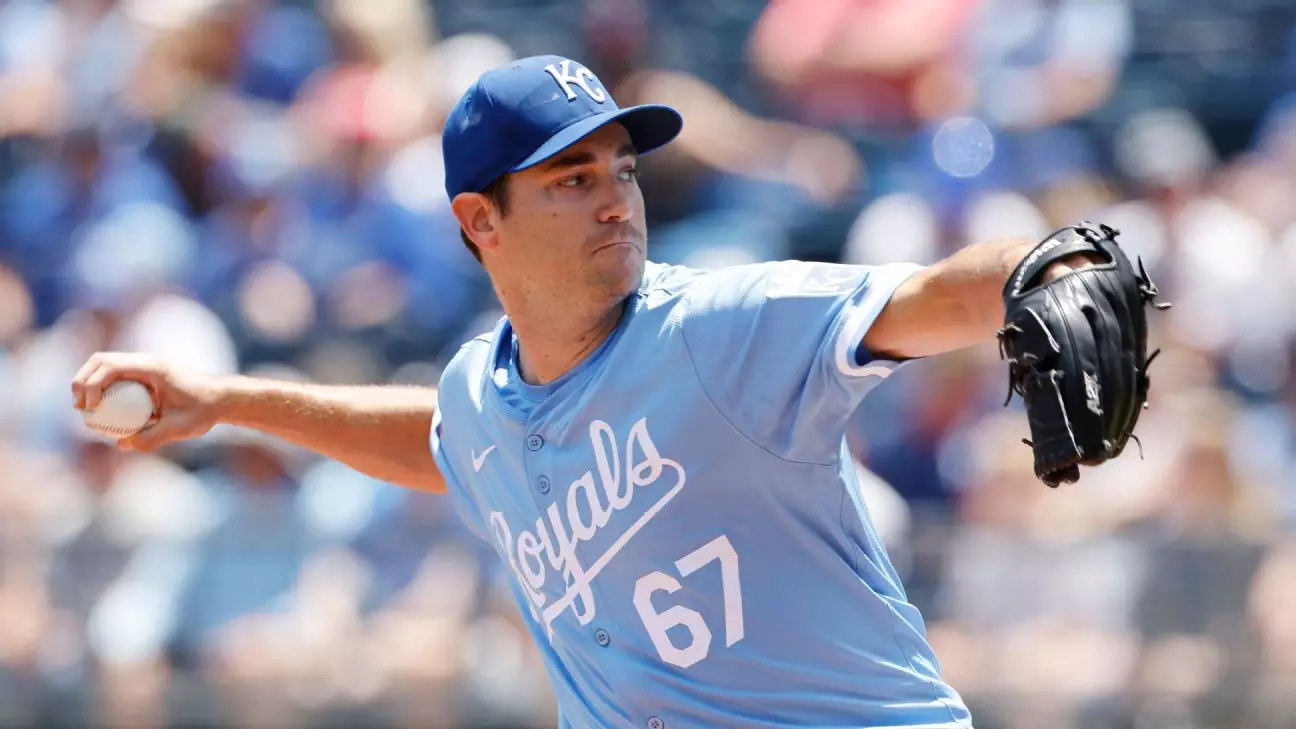In the unpredictable landscape of Major League Baseball, few moments encapsulate the delicate balance between team loyalty and strategic calculations better than the unwavering support that Kansas City Royals’ players, like Vinnie Pasquantino, show towards their teammates. Pasquantino’s enthusiastic gesture toward Seth Lugo’s locker after an impressive outing signals more than camaraderie; it highlights the importance of unity in a season marked by uncertainty. Despite the Royals’ middling standing, Pasquantino’s insistence on Lugo’s continued presence reflects a core belief in the value of internal stability — even when external factors, like the looming trade deadline, threaten to fracture team cohesion.
This scene reveals something profound: loyalty isn’t just a sentimental virtue but a strategic asset. For players like Lugo, the support from teammates can provide motivation and a sense of belonging during a whirlwind period of speculation about their futures. Conversely, for the Royals’ management, loyalty from players can serve as a stabilizing force amid rumors of trades, potential roster dismantling, or roster reshuffles. The players’ collective hope, expressed openly yet quietly in gestures and words, underscores a broader narrative about what it truly means to build a resilient team. It’s not just about statistics or standings but about the collective belief in the team’s potential—even when the odds seem stacked against them.
The Economics of Talent in a Competitive Market
Lugo’s situation exemplifies a larger debate that underpins the current state of professional baseball: how do teams maximize value while managing the inherent volatility of player markets? As Lugo approaches free agency and displays an exemplary 2.95 ERA, he becomes a prime commodity. His performance in the sweltering Chicago heat proved that he can be a difference-maker, especially considering the unpredictability of rotation injuries and inconsistent pitching across teams contending for playoff spots.
Kansas City’s willingness to consider trading Lugo makes strategic sense, yet it also reveals a deeper dilemma. Do teams prioritize immediate gains over long-term stability? The Royals’ front office faces a tough choice: leverage Lugo’s market value to bolster future prospects or hold onto him in the hope that his leadership and current form could help them close the season strongly. The fact that Lugo prefers to stay underscores a crucial point—player loyalty and the desire to compete within a familiar environment can sometimes outweigh financial or strategic incentives. This tension between economic benefits and personal or collective loyalty is at the heart of modern sports management, where decisions are often driven by short-term needs versus long-term vision.
Unpredictability of the Playoff Race and the Myth of the Perfect Strategy
Despite their recent victories, the Royals remain a team on the fringes of postseason contention — four games behind the wildcard cutoff with multiple rivals in their path. Manager Matt Quatraro’s comments about the season’s unpredictability illuminate the core truth of baseball: there is no foolproof formula for success. Whether a team adds or subtracts pieces before the trade deadline, outcomes hinge on intangible factors like chemistry, momentum, and managerial intuition.
Quatraro’s dismissive attitude toward the trade rumors and his focus on what his team can control exemplify a leadership style rooted in resilience rather than reaction. His acceptance that fortunes can change regardless of roster moves is a refreshing acknowledgment of baseball’s chaotic nature. This perspective encourages teams to stay flexible, avoid overstating the importance of any single transaction, and instead cultivate a mindset that values consistency and internal growth. The Royals’ current strategy, or lack thereof, might not guarantee a playoff spot, but it embodies an understanding that success often depends more on mental fortitude than on acquiring the biggest names or making the flashiest trades.
The Role of Confidence and Internal Motivation in a Playoff Chase
Lugo’s statement about controlling what he can control resonates strongly in a season fraught with external pressures. In a sport where rumors swirl about trades and future team compositions, maintaining mental focus is crucial. Lugo’s attitude demonstrates a mature recognition that obsessing over speculation can undermine performances. His desire to remain with the Royals — expressed with admirable clarity — reveals a deep internal motivation rooted in pride and a hope for team success.
Pasquantino’s vow to keep Lugo in Royals blue by advocating for his retention encapsulates the intangible emotional glue holding the team together. These players understand that long seasons are won through effort, belief, and resilience rather than external validation or fleeting opportunities. Their stance suggests a philosophy that success is less about immediate wins and more about believing in the collective mission, despite external turbulence. This internal conviction, perhaps more than any strategic move, is what sustains teams through difficult periods and keeps hopes alive for postseason breakthroughs.
The Uncertain Future and the Courage to Stay the Course
As the trade deadline approaches, the Royals’ future remains uncertain. Their current positioning is a testament to the narrow margins of playoff contention—just a few games here or there could shift the trajectory dramatically. The decision to trade or retain assets like Lugo is complex, rooted not only in statistical performance but also in philosophical outlooks about team-building.
Manager Quatraro’s comments about season unpredictability reflect a healthy skepticism about the over-reliance on roster moves. Instead, success hinges on internal development, strategic patience, and the players’ collective mental toughness. The Royals’ approach underscores a critical truth: in baseball, as in life, perseverance and belief in your team’s core resilience often outweigh short-term adjustments. Lugo’s desire to stay and fight with his teammates exemplifies this ethos—an acknowledgment that enduring seasons are not made through quick fixes but through sustained effort and unwavering confidence in the team’s potential.
This season exemplifies the fine line every team walks between doing enough to contend and accepting the harsh realities of rebuilding or retooling. The Royals’ journey is far from over, but their true strength may lie in their willingness to stay committed to their internal values, trusting that resilience and belief can turn the tides even in the most uncertain of seasons.


Leave a Reply